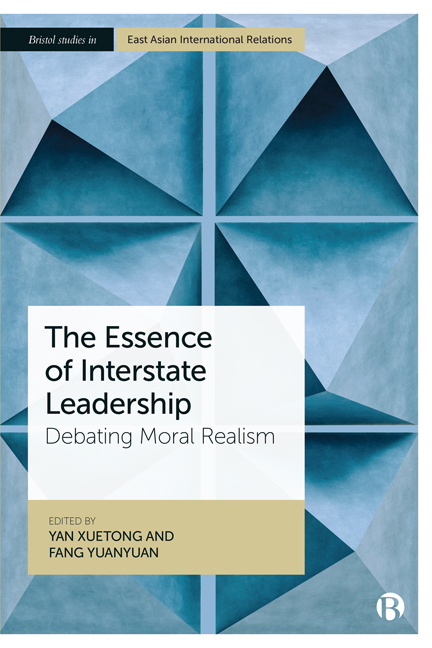Book contents
- Frontmatter
- Contents
- List of Abbreviations
- Notes on Contributors
- Preface
- 1 Interstate Leadership, Moral Realism, and their Critics
- 2 IR Moral Realism as a Universal Theory
- 3 Moral Realism as an Alternative Approach to the Agent-Structure Problem
- 4 Prospects, Promise, and Limitations of Moral Realism
- 5 Ideal Morality and Realist Interest of Moral Realism
- 6 The Conception of Morality in Moral Realism
- 7 Moral Realism and Hegemonic Transition
- 8 Innovation of Moral Realism and Dialogue with It
- 9 Moral Realism and Sino-American Relations
- 10 Moral Realism on Interstate Leadership in Response to Critics
- Appendix 1 Written Discussion between Rajesh Rajagopalan and Yan Xuetong
- Appendix 2 ‘Chinese School’ as an Inappropriate Title
- Selected Bibliography
- Index
3 - Moral Realism as an Alternative Approach to the Agent-Structure Problem
Published online by Cambridge University Press: 18 January 2024
- Frontmatter
- Contents
- List of Abbreviations
- Notes on Contributors
- Preface
- 1 Interstate Leadership, Moral Realism, and their Critics
- 2 IR Moral Realism as a Universal Theory
- 3 Moral Realism as an Alternative Approach to the Agent-Structure Problem
- 4 Prospects, Promise, and Limitations of Moral Realism
- 5 Ideal Morality and Realist Interest of Moral Realism
- 6 The Conception of Morality in Moral Realism
- 7 Moral Realism and Hegemonic Transition
- 8 Innovation of Moral Realism and Dialogue with It
- 9 Moral Realism and Sino-American Relations
- 10 Moral Realism on Interstate Leadership in Response to Critics
- Appendix 1 Written Discussion between Rajesh Rajagopalan and Yan Xuetong
- Appendix 2 ‘Chinese School’ as an Inappropriate Title
- Selected Bibliography
- Index
Summary
The agent– structure problem has been the root cause of deeply entrenched disputes of international relations (IR), stretching from the late medieval differentiation between the individual and the state to contemporary metatheoretical controversies within epistemology and political ontology. Despite their many differences, however, the ‘agent– structure’, ‘parts– whole’, and ‘micro– macro’ problems all reflect the same metatheoretical imperative of the need to explain the ontological and explanatory relationship between social actors or agents (in this case, states) and societal structures (in this case, the international system). The agent– structure problem has ‘at present evolved into what is often claimed to constitute the central problem in social and political theory’.
Knafo argues that the agent– structure debate shows how hard it is to integrate a structural conception of power with a concept of social change associated with an agency. He maintains that, by overemphasizing the dynamics of social reproduction, the notion of structural power has made it hard to account for social change. Moral realism, by treating political leadership as the independent variable explaining the rise and fall of great powers, and potentially the changes of international norms and systems, provides an answer to such social change and an alternative perspective to the existing agency and structural analyses, linking individual, state, and system levels of analyses. Instead of simply granting agents the determinative role in relation to structure, moral realism provides a dualist theory, valuing the importance of leaders in decision making and the importance of a nations’ relative capability and status in the international system.
This chapter follows a three- tier structure. First, it provides an in- depth analysis of how moral realism deals with the problem of agent– structure. Second, it revisits the agent– structure debate and compares moral realism's take on the debate with other prominent analyses. Third, it critically analyses the problems and the challenges lying ahead of moral realism and provides related suggestions for the further development of this valuable theory.
Bringing agent back to realist discourse
Engaging classical realism and Chinese philosophy, moral realism brings agent- level analysis back to realist discourse by explaining the rise and decline of great powers through political leadership as the key independent variable.
- Type
- Chapter
- Information
- The Essence of Interstate LeadershipDebating Moral Realism, pp. 31 - 51Publisher: Bristol University PressPrint publication year: 2023



